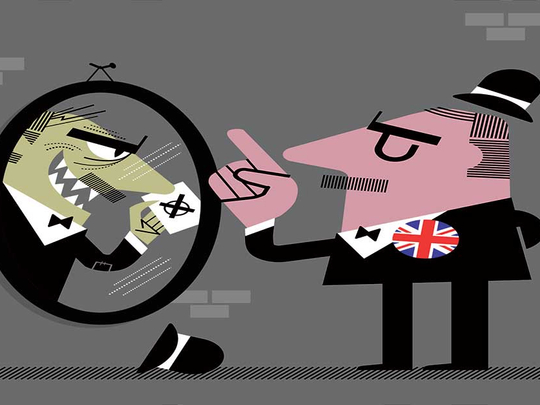
Mirror, mirror on the wall which is the ugliest ism of them all? Racism. The recent Brexit vote brings this to mind. To paraphrase the novelist and commentator, Will Self: not every Brexiter is racist, but almost all racists voted leave.
In the wake of the UK voting to leave Europe there has been an explosion of racially-aggravated public order offences spanning the length and breadth of the nation. Racist graffiti and pamphlets appeared calling for “no more Polish vermin”.
On social media Brexit triumphalism included sentiments such as, “Oi Muslims pack your bags”, and “Get out, we voted leave”. The UK’s National Police Chiefs Council suggest that reports of hate crimes rose almost 500 per cent in the first week after Brexit. Rule Britannia is in danger of becoming cruel Britannia.
In the UK a hate crime is an offence motivated by hostility towards a person (or their property) based on any aspect of their social identity; this could be gender, disability, race, ethnicity, religion or sexual orientation.
In 2014 the Police in England and Wales recorded 44,480 hate crimes, 84 per cent of which were racially motivated. Furthermore, between 2012 and 2014 there was a 14.7 per cent increase in the rate of racially motivated hate crimes being referred to the Crown Prosecution Service (Courts). This suggests that hate crimes were enjoying a boom well before Brexit.
As a child growing up in the north of England in the 1980s, racist graffiti was ubiquitous to the point of banality. Claiming an affiliation with a fascist group like the NF (National Front) or the APL (Anti-Pakistani League) was particularly popular in my school. However, things changed for the better — or at least they seemed to. Racially motivated graffiti and name-calling all but vanished.
‘Them’ and ‘us’
Now however, it seems the original and ugliest ism of all — racism — is enjoying something of a popular revival. Why?
This is a difficult question. Firstly, we can’t even agree on a definition of racism or, for that matter, if “race” is even a meaningful concept. It’s easier and less emotive to explore the issue using broader terms such as out-group bias and out-group hostility.
Out-groups are basically “them”, anyone we perceive as not being part of our in-group — not one of “us”. For some people immigrants are them, Mexicans are them, expatriates are them.
This is all OK until we start to make preconceived negative judgements about “them” on the basis of their out-group membership (race, gender, religion, sexual orientation, nationality). When we do this, we call it prejudice. If we act on the prejudice we call it discrimination, and if that action is hostile and aggressive we might call it a hate crime.
Social psychologists have spent decades exploring the ins and outs of in-groups and out-groups, and we know that we think and act in very predictable ways towards people we perceive as being out-group members.
We are more likely to attribute their (out-group members) misdeeds to their flawed or evil natures, while the misdemeanours of fellow in-group members are more frequently attributed to the situation. They (the out-group) are perceived as all being very similar to one and other, while we, on the other hand, differ greatly.
We also know that acts of hostility and aggression towards out-group members are frequently preceded by frustration, particularly economic frustration. For instance, a study published in the Journal of Personality and Social Psychology, reports that between 1882 and 1930, the number of lynchings of African Americans in the American South, was highly correlated with cotton prices; low cotton prices meant more lynchings.
This is all very basic psychology and, to some extent, knowing it can help protects us from the worst aspects of ourselves. The greatest obstacle to human progress is humans.
I’m baffled as to why psychology (the scientific study of human thinking and behaviour) is not more frequently taught in schools? We need to push for greater psychological literacy if we hope to have tolerant, compassionate and well-adjusted societies.
Dr Justin Thomas is an associate professor of psychology at Zayed University.









